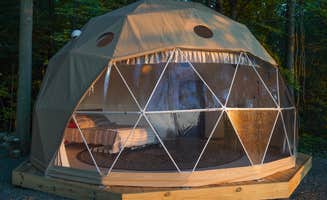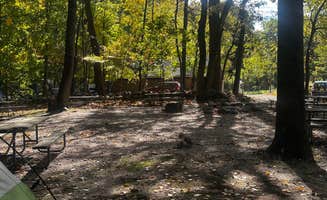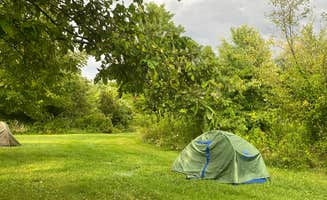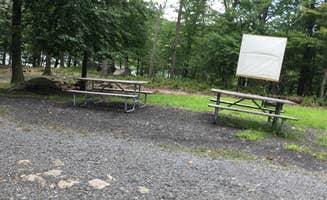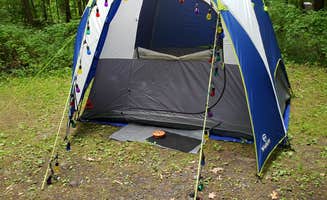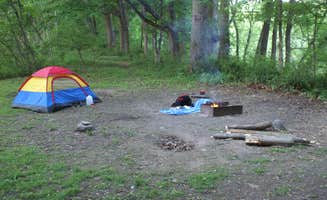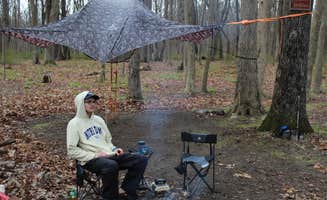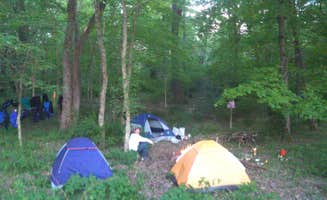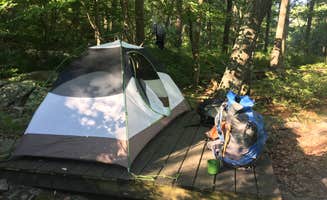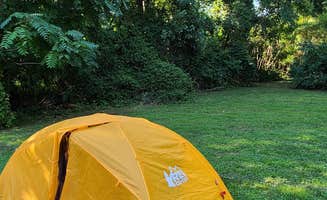Tent camping options near Newfoundland, New Jersey range from primitive riverside island sites to established state park campgrounds within a 30-minute drive. The region sits within the northern highlands of the state at elevations between 700-1,200 feet, creating cooler summer temperatures than surrounding lowlands. Fall camping season often extends through late October with colorful foliage displays, though nighttime temperatures can drop below 40°F by mid-autumn.
What to do
Paddle to isolated camping: Namanock Island in Delaware Water Gap offers unique tent sites accessible only by water, approximately 4 miles downstream from Milford Beach. "The island was once a part of the Lenape Indian's territory... Beautiful trails criss-cross the island and not a rock to be tripped over. I do not think I have worn shoes there even once," notes a Namanock Island camper.
Hike to waterfalls: Both sides of the Delaware River feature waterfall access within hiking distance of campsites. "If you paddle across the river from the site, it is only a 10-15 minute hike along the road on the Pennsylvania side of the river to reach Raymondskill Falls. A 'must-see' if your stopping here," recommends a river camper.
Explore primitive trails: The Stonetown Circular trail loop features multiple primitive tent sites at different points along its 11-mile route. "This is a great spot to set up camp because it has a wide area and an amazing view. You will find the site right next to the American Flag at the top of the mountain," notes a camper at Stonetown Circular trail Primitive #1.
What campers like
Morning wildlife viewing: Multiple campsites report frequent wildlife sightings, especially during early morning hours. "Saw tons of bald eagles flying near the site and while paddles birds playing and baby geese with their mommas!" reports one Delaware Water Gap camper about their river experience.
Private island camping: Island camping creates a sense of isolation that mainland sites cannot match. According to one camper, "Let me say that of all the places I have ever camped, having an entire island to yourself is a feeling I have never experienced anywhere else."
Evening stargazing: The distance from urban light pollution creates excellent night sky viewing opportunities. "Once darkness falls there are no lights to be seen in either direction, up or down river. Now, no lights means an incredible view of the night sky," notes a review from Jenny Jump State Forest.
What you should know
Seasonal accessibility: Many campgrounds in the region operate on a limited seasonal schedule. "Campsites were open in June. Pros: Clean, access to kayaking/beach/trails. Largely friendly staff and campers," notes a visitor to Wawayanda State Park Campground.
Fire restrictions: Fire rings are available at most sites, but rules vary. "There is a fire ring suitable for cooking on as well as allowing you a small fire. You will also have access to a privy style toilet a short distance in the woods behind your site," reports a Namanock Island camper.
Cell service limitations: Many camping areas lack reliable phone service. "No phone service at campsite, but could get phone service by the kayak hut or the main entrance," reports a Wawayanda camper, reflecting a common situation throughout the region.
Difficult terrain access: Some of the most scenic tent sites require significant physical effort. One camper notes about Stonetown Circular trail: "The only difficult thing about this site is that it is at the top of a fairly difficult rock scramble. I would advise packing light if making camp at this site because a heavy pack would make this scramble up the mountain even harder."
Tips for camping with families
Dome glamping option: For families new to camping or with young children, consider alternative shelter options. "The Moon Valley Campground is an awesome spot for those who want to camp in luxury, with their awesome dome structures. The campground is also near the Appalachian trail while still only about an hour from Manhattan!" suggests a visitor to Moon Valley Campground.
Shelter camping alternative: State forests offer wood shelters as tent alternatives. "This is the first time we decided to forgo tent camping and reserve a shelter at a state park. We had a much better experience than we were expecting! The 'shelter' is what we would describe as a 'cabin'; four walls, a roof, locking door, locking windows," shares a Jenny Jump camper.
Educational programming: Some parks offer ranger-led activities for children during summer months. "They do big bon 🔥 on Saturday very kid friendly ranger Joe is 👌 with the kids and they have 🔥 wood for purchase on site," reports a camper at Sebago Cabin Camp.
Tips from RVers
Limited hookup options: Most campgrounds near Newfoundland offer primitive tent camping rather than RV facilities. "Campgaw doesn't seem to offer much in terms of a camping experience. The sites themselves are fairly close to the road and there are super popular hiking trails that run right through all the camps," notes a visitor to Campgaw Mountain Reservation.
Weekday availability: Campers report significantly better experiences at all area campgrounds during weekdays versus weekends. "Once the sun goes down, the campsite becomes a ghost town (except for the odd sheriff driving down the road). We went on a holiday weekend, and we were the only campsite that was occupied, so that is absolutely a plus."
Water access planning: Many tent sites require carrying water in from central locations. "This is PRIMITIVE camping.... No bathrooms, no facilities of any sort. Everything must be packed in and out, or you wont have it," explains a river camper, reflecting the situation at many of the tent camping options near Newfoundland.


